Struggling to balance on one leg for 20 seconds or longer was linked to an increased risk for small blood vessel damage in the brain and reduced cognitive function in otherwise healthy people with no clinical symptoms, according to research in the American Heart Association’s journal Stroke.

Photo by rawpixel.com on Pexels.com
“Our study found that the ability to balance on one leg is an important test for brain health,” said Yasuharu Tabara, Ph.D., lead study author and associate professor at the Center for Genomic Medicine at Kyoto University Graduate School of Medicine in Kyoto, Japan. “Individuals showing poor balance on one leg should receive increased attention, as this may indicate an increased risk for brain disease and cognitive decline.”
The study consisted of 841 women and 546 men, average age of 67. To measure one-leg standing time, participants stood with their eyes open and raised one leg. The maximum time for keeping the leg raised was 60 seconds. Participants performed this examination twice and the better of the two times was used in the study analysis. Cerebral small vessel disease was evaluated using brain magnetic resonance imaging.
Researchers found that the inability to balance on one leg for longer than 20 seconds was associated with cerebral small vessel disease, namely small infarctions without symptoms such as lacunar infarction and microbleeds. They noted that:
- 34.5 percent of those with more than two lacunar infarction lesions had trouble balancing.
- 16 percent of those with one lacunar infarction lesion had trouble balancing.
- 30 percent of those with more than two microbleed lesions had trouble balancing.
- 15.3 percent one microbleed lesion had trouble balancing.
Overall, those with cerebral diseases were older, had high blood pressure and had thicker carotid arteries than those who did not have cerebral small vessel disease. However, after adjustment for these covariates, people with more microbleeds and lacunar infarctions in the brain had shorter one-legged standing times. Short one-legged standing times were also independently linked with lower cognitive scores.
Although previous studies have examined the connection between gait and physical abilities and the risk of stroke, this is among the first study to closely examine how long a person can stand on one leg as an indication of their overall brain health.
“One-leg standing time is a simple measure of postural instability and might be a consequence of the presence of brain abnormalities,” said Tabara.
Small vessel disease occurs due to microangiopathy of arterioles in the brain, making these arteries less flexible, which can interfere with blood flow. Small vessel disease typically increases with age. Loss of motor coordination, including balance, as well as cognitive impairment has been suggested to represent subclinical brain damage. Tabara and colleagues also found a strong link between struggling to stand on one leg and increased age, with marked shorter one-leg standing time in patients age 60 and over.
Although the study did not assess participants’ histories of falling or physical fitness issues, such as how fast they could walk or any gait abnormalities, Tabara said the one-leg standing test is an easy way to determine if there are early signs of being at risk for a stroke and cognitive impairment and whether these patients need additional evaluation.








That’s very interesting! It just shows how we are connected in so many ways.
LikeLiked by 1 person
I agree. The body is really fascinating. When I retired I started taking courses from The Teaching Company. Now, 18 years later, I have studied the brain, aging, physiology and nutrition to name a few. The company has changed its name to The Great Courses. I recommend it.They have superb teachers and your courses go online. I can access any of them from my laptop. I have also taken all the music courses Dr. Robert Greenberg offers.
LikeLike
H’mmm, I will look into the company. But, and it’s a big but, I’m behind on my book writing and blog is a big draw. And my recall is pretty poor these days! But I will take a peek and maybe be tempted. For I also am convinced that one should never stop learning!
LikeLiked by 1 person
Good luck! Didn’t mean to sound like a salesman. I have no financial interest in them. Just love the product.
LikeLike
No, I understood that.
LikeLike